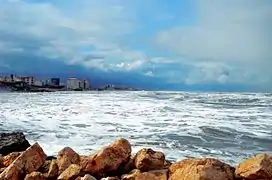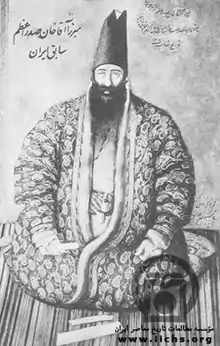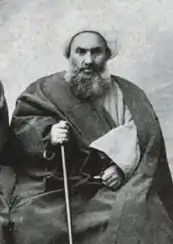Nur, Iran
Nur (Persian: نور, also Romanized as Nūr, Nour, and Noor); Nursar (Persian: نورسر), formerly, Suldeh,[3] is a city in the Central District of Nur County, Mazandaran province, Iran, and serves as both capital of the county and of the district. It is on the Caspian Sea.
Nur
Persian: نور | |
|---|---|
City | |
 Narenjestan Hotel area, Nur | |
 Nur | |
| Coordinates: 36°34′15″N 52°00′36″E[1] | |
| Country | Iran |
| Province | Mazandaran |
| County | Nur |
| District | Central |
| Population (2016)[2] | |
| • Total | 26,947 |
| Time zone | UTC+3:30 (IRST) |
At the 2006 National Census, its population was 21,806 in 6,164 households.[4] The following census in 2011 counted 22,978 people in 6,815 households.[5] The latest census in 2016 showed a population of 26,947 people in 8,597 households.[2]
Overview
Nur is one of the oldest cities of Mazandaran Province. Located on the Caspian Sea coast. It derives its name from Nur County, of which it is the administrative seat. In the past, Nur was reputedly known as Suldeh and is one of the ancient cities of Mazandaran. Nur Forest Park, the largest forest park in the West Asia with an area about 4000 hectares and a variety of plant species, is located in this region.
Notable people




- Mirza Aqa Khan Nuri (1807–1865) otherwise known as Aqa Khan Nuri, E'temad-ol Dowleh was a politician in Qajar Iran, who served as prime minister (ṣadr-e aʿẓam) between 1851 and 1858 during the reign of king Naser al-Din Shah Qajar.
- Nima Yooshij (1897–1960), also called Nimā born Ali Esfandiāri, was a contemporary Persian and Tabarian poet who started the she'r-e now ("new poetry") also known as she'r-e nimaa'i ("Nimaic poetry") trend in Iran. He is considered as the father of modern Persian poetry.
- Sheikh Fazlollah Noori (1843–1909), was a prominent Shia Muslim cleric in Qajar Iran during the late 19th and early 20th century and founder of political Islam in Iran.
- Bahá'u'lláh (1817–1892), was a Persian religious leader, and the founder of the Bahá'í Faith, which advocates universal peace and unity among all races, nations, and religions.
- Gholam-Hossein Banan (1911–1986) was an Iranian musician and singer. One of the most prominent Iranian singers of the 20th century, he was renowned for the quality of his voice.
- Haji Washington (1849–1937) was an Iranian politician, cabinet minister, and diplomat and belonged to one of the oldest aristocratic families in Persia – the Khadjenouris, tracing their history back to over one thousand years.
- Subh-i-Azal (1831–1912), was a Persian religious leader of Azali Bábism[ also known as the Bayání Faith.
- Mirza Husain Noori Tabarsi (1838–1902), popularly known as Muhaddis Noori / Al-Mohaddith Al-Noori, was a top Shi'a Islamic cleric and father of Islamic Shi'a Renaissance.
- Noureddin Kianouri (1915–1999), politician and revolutionary.
- Parviz Natel-Khanlari (1914–1990) was an Iranian literary scholar, linguist, author, researcher and professor at Tehran University.
- Hossein Shah-Hosseini was an Iranian politician who served as the head of the Physical Education Organization, as well as the National Olympic Committee during the interim cabinet of Mehdi Bazargan.
- Ali Akbar Nategh-Nouri s an Iranian politician.
- Mirza Hassan Khan Esfandiary (1867–1945) was an Iranian politician and 12th chairman of the Iranian parliament.
- Gholam Hossein Sadighi was an Iranian politician and Minister of Interior in the government of Prime Minister Mohammad Mossadegh in 1953.
- Abolhassan Sadighi was an Iranian sculptor and painter and was known as Master Sadighi. He was a student of Ghaffari.
- Manouchehr Sotoudeh was an Iranian geographer and scholar of Persian literature. He wrote 60 books and nearly 300 articles.
- Musa Nuri Esfandiari was an Iranian diplomat and served as foreign minister and as ambassador during the Pahlavi era.
- Pirouz Mojtahedzadeh is an Iranian political scientist and historian. He is a prominent Iranologist, geopolitics researcher, historian and political scientist. He teaches geopolitics at the Tarbiat Modares University of Tehran. He has been the advisor of the United Nations University.
- Rahman Rezaei is an Iranian retired football player and coach. He is also a former member of the Iran national football team and usually played in the Centre-back position.
- Hamed Kavianpour is a retired Iranian professional football player.
- Roya Nonahali is an Iranian actress. She studied painting, and has worked in theatre since 1984.
- Hanif Omranzadeh is an Iranian former footballer who played as a defender and current coach of Esteghlal F.C. Academy youth team.
- Mirza Abdul Vahab Khan Nizam al-mulk From the courtiers of the Qajar period.
- Mirza Mohammad Khan Nuri Secretary of State for Foreign Affairs of Iran during the Qajar period.
- Hassan Nayerzadeh is an Iranian teacher.
- Ahmad Nategh-Nouri is a politician.
- Mirza Muhammad Taqi Noori Tabarsi Shiite scholars in the thirteenth century.
- Abdollah Behzadi (1918–1976), politician, poet, writer and physician.
- Ahmad Esfandiari (1922–2013), Artist and painter.
- Hosein Gil is an Iranian actor.
- Parvaneh Kazemi an Iranian climber.
References
- OpenStreetMap contributors (27 May 2023). "Nur, Nur County" (Map). OpenStreetMap. Retrieved 27 May 2023.
- "Census of the Islamic Republic of Iran, 1395 (2016)". AMAR (in Persian). The Statistical Center of Iran. p. 02. Archived from the original (Excel) on 7 October 2021. Retrieved 19 December 2022.
- Nur, Iran can be found at GEOnet Names Server, at this link, by opening the Advanced Search box, entering "-3086399" in the "Unique Feature Id" form, and clicking on "Search Database".
- "Census of the Islamic Republic of Iran, 1385 (2006)". AMAR (in Persian). The Statistical Center of Iran. p. 02. Archived from the original (Excel) on 20 September 2011. Retrieved 25 September 2022.
- "Census of the Islamic Republic of Iran, 1390 (2011)" (Excel). Iran Data Portal (in Persian). The Statistical Center of Iran. p. 02. Retrieved 19 December 2022.
External links
- "Nur, Iran", Falling Rain Genomics, Inc.